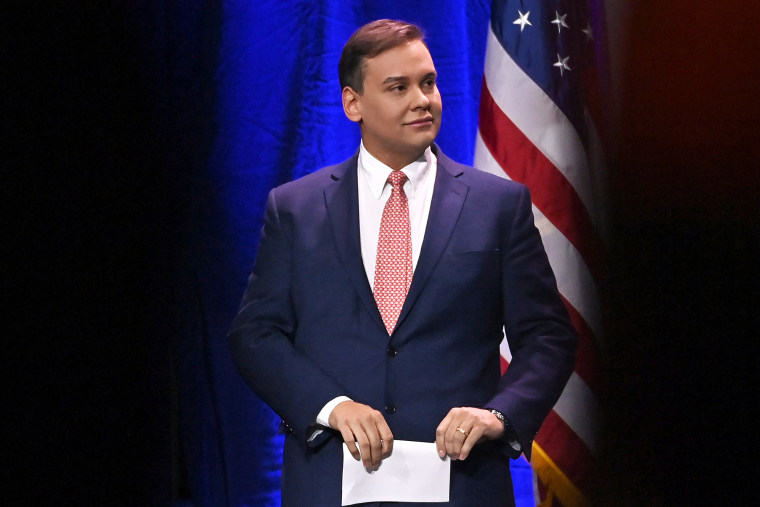Republican Rep.-elect George Santos of New York is a member of a party that has normalized the use of misdirection, factual distortions and systematic disinformation to advance its political agenda. Yet as the new Congress convenes this week it seems possible that Santos’ fledgling political career could, potentially, end quickly over lies he’s told. How has he achieved this unusual distinction?
It mainly comes down to the fact that he has not told the right kinds of lies.
The Trump era taught us that big lies are tolerable on the right when it comes to exploiting the base’s existing biases, prejudices and mistrust. But Santos' clumsy fabrications about his background and resume are about himself rather than perceived enemies, and the sheer number and scope of them have shocked and generated unease among his allies. Santos' disinformation generates controversy — but it lacks the crucial political benefit of getting the base excited, which makes the GOP less likely to put up with it.
Trump’s most powerful lies exploited underlying beliefs that his base already had.
If you haven’t been keeping up with the bizarre Santos story, it turns out he’s lied about a shocking number of biographical details that likely were key to his appeal as he made his successful bid for Congress. Reporting from a number of news outlets in recent weeks has shown that he’s lied about where he went to school, where he went to college, where he worked, his mother’s death, his religious background, and his relation to Holocaust survivors. Santos has grudgingly admitted to many of the big lies about his background, but he's declined to step down and he's been comically flippant about the public's discovery that his entire personal narrative was basically made up. He downplays his systematic dishonesty as a matter of mere embellishment, and he's asked for people to move on because “we all make mistakes."
Perhaps Santos thinks he can get away with being a fraud because the most popular Republican in America is, in many ways, a fraud. But it’s not exactly working for him so far. Fox News surprisingly raked Santos over the coals for his lies in a tough interview; one of Santos' incoming Republican colleagues has already called for a House ethics investigation into his lies; and a veteran Republican congressman from Texas has said Santos should consider resigning. On top of all that, federal prosecutors are investigating his campaign funding and expenditures, some of which already look shady so far according to reporting from The New York Times. Republican leadership has been silent so far, but if they turn on Santos he'd be in serious trouble; the House has a procedure available to it for expelling Santos from Congress if he refuses to resign. While I wouldn't bet on GOP leadership doing the right thing here, it's worth thinking about why Santos' lies seem so jarring even to some of its own members.
The rise of Donald Trump illustrated how bald dishonesty could be tolerated in American politics by a right-wing politician’s sympathizers. But while Trump’s lies were constant, sometimes weird, and not-infrequently senseless, there was often a method to the madness. Trump’s most powerful lies exploited underlying beliefs that his base already had.
Consider the two biggest lies that bookend Trump’s rise and his fall: the racist birther lie that Barack Obama wasn’t born in the U.S., and the lie that the 2020 election was stolen from Trump. There is no evidence to support either claim, and there’s plenty of evidence that clearly contradicts them. But the lies got traction and traveled because Trump was tapping into latent belief systems that existed among his base. In the case of the birther lie, Trump tapped into a bigoted suspicion that Obama was in some way fundamentally foreign and didn’t belong in elected office; in the case of the 2020 lies, Trump exploited the hunch that the country is rigged by "deep state" elites to strip MAGA Americans of their power. And in countless other cases, whether lying about rapists from Mexico or the nature of Obama's health care policies, he used untruth to confirm biases and d that his base held before he even began his campaigns of deception.
Exploitation of bias also helps explain how Rep. Marjorie Taylor Greene of Georgia has survived in Congress despite her affiliation with lies that are even more outlandish than Trump's. Her theories that Jewish-controlled space lasers caused wildfires are bigoted and preposterous. But since the claims slot into the contours of white nationalist belief systems — Jews "control" the world; climate change is a hoax — they don’t necessarily elicit the kind of reaction that Santos is getting from some on the right. While Greene's lies can damage the party's reputation, they are at least contiguous with the MAGA wing's value system, and help explain why the base loves her. Santos making up stuff about his past is bad controversial energy without any accompanying political benefit.
None of this is to equate Santos’ lies to those of some of his GOP colleagues or to say that one kind is more morally or intellectually defensible. But the swirl of controversy around Santos reveals how the most effective lies on the right involve exploiting mistrust of The Other. Instead of projecting lies that fuel the political base he’s courting, Santos has only drawn scrutiny to himself.

